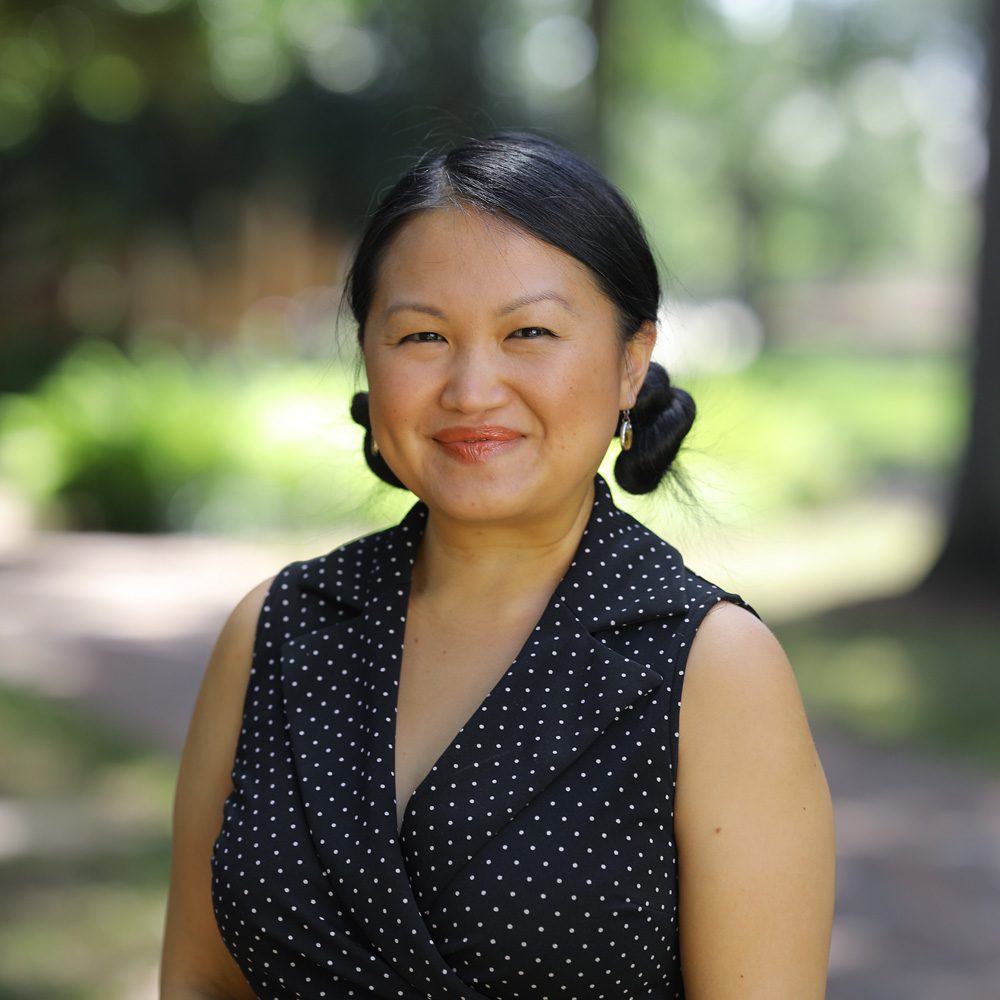
Mai Nou Xiong-Gum
Assistant Professor, Communication Studies
- Email: mnxiong.gum@furman.edu
- Phone: 864.294.3145
- Office: 135A Furman Hall
Dr. Mai Nou Xiong-Gum is an Assistant Professor of Communication Studies at Furman University. Her latest research focuses on understanding the role of mobile communication and ICTs as they reconfigure our spaces of sociality, and, therefore, our communities and civic communication processes.
Her research continues to focus on the rhetoric of borders, hybrid mobilities, and forced migrant capabilities in our emerging new media settings. Thematically in her teaching, she encourages students to consider how media and media practices are rhetorical—but that access to media and the infrastructure that support media practices are not distributed evenly. As such, she investigates—in her research and with her students—how media and communication practices are tied to the politics of exclusion (and citizenship), particularly in the cases of minoritized / marginalized people, women, and displaced and emplaced persons.
She has published in Rhetoric Review, Kairos, and Communication Theory. Prior to Furman, Dr. Xiong-Gum has taught courses in digital rhetoric, technical communication, and civic media. At Furman, she teaches some introductory courses such as Digital Storytelling, Media & Society, and Public Speaking; and special topics on International Women's Rhetoric, Civic Media, Mobile Media, and Cultural Rhetorics. Additionally, she teaches an FYW course on Technofeminism.
Dr. Xiong-Gum joined the Furman Communication Studies faculty in Fall 2020, and she holds a Mellon Fellowship. Before Furman, she completed her doctoral research in the Communication, Rhetoric, and Digital Media program at North Carolina State University.
Honors & Rewards
- Best Paper Award - SIGDOC, Association for Computing Machinery, 2022 (Boston, MA, USA)
- Mellon Fellow - Furman University, 2020-2023
- Top Papers - Mobile Communication Interest Group, International Communication Association, 2020 (Gold Coast, Australia)
Education
- Ph.D. in Communication, Rhetoric, Digital Media, North Carolina State University
- M.A. in English, Western Carolina University
- B.A. in Political Science and French, University of North Carolina (Asheville)
Research Interests
Dr. Xiong-Gum studies cultural and digital rhetoric to understand how both the cultural practices of communities and their media environments shape public discourse, (virtual) community building, and civic engagement.
She has a special interest in understanding how displaced and emplaced communities such as forced migrants use techne—what Aristotle refers to as the art of using the available means necessary— and creativity to attune to the changing configurations of borders, mobility regimes, and changing or emerging communication landscapes.
Using rhetorical theory that is informed by media theory, she investigates how power operates and displaces information, people, and communities. For this reason, she is interested in the rhetorical media practices of minoritized communities.
As an interdisciplinary scholar, her research draws from studies in mobile communication, critical mobilities, postcolonial studies, critical race theory, gender / feminist theory, and communication + composition studies.
In her classes, you will find yourself using rhetorical theory to understand user experiences and the design of communication; and you will find yourself using media theory to understand the consequences and affordances of your media choices.
Publications
- Roberts, Laura & Mai Nou Xiong-Gum. (2022). Vandal Fighting as Connective Intelligence: Analyzing Edits to the “2022 Russian Invasion of Ukraine” Wikipedia Article. Proceedings of the 40th Association for Computing Machinery International Conference on Design of Communication (SIGDOC '22). [Recipient of Best Paper Award]
- de Souza e Silva, Adriana & Mai Nou Xiong-Gum. (2022). Mobile Networked Creativity Repository [Crowdsource Database] https://mobilenetworkedcreativity.pubpub.org;
- de Souza e Silva, Adriana & Mai Nou Xiong-Gum. (2020). Mobile networked creativity: Developing a theoretical framework for understanding creativity as survival. Communication Theory, 30(4), 1-20.;
- Gollihue, Krystin & Mai Nou Xiong-Gum. (2020). Dataweaving: Textiles as data materialization [Interactive Web-text]. Kairos: A Journal of Rhetoric, Technology and Pedagogy, 25(1).;
- Xiong-Gum, Mai Nou. (2020). Review of Mobile Communication and low-skilled migrants’ acculturation to cosmopolitan Singapore by Rajiv George Aricat & Rich Ling. International Journal of Communication, 14, 4003-4006.;
- Sackey, Donnie, Casey Boyle, Mai Nou Xiong, Kristin Arola, Gabriela Rios & Scot Barnett (2019). Secrets and Mattering: A Posthuman Approach to the Plain of Jars, in Perspectives on Cultural and Posthumanist Rhetorics. Rhetoric Review, 38(4), 375-401.;
- Roberts, Laura, Mai Nou Xiong-Gum & Matt Halm. (2019). Continuing the Conversation of Rhetoric’s Keywords [Video featuring, Kristin Arola, Casey Boyle, Karma Chávez, Byron Hawk, Chris Ingraham, and Carolyn Miller]. Available from, https://vimeo.com/329912679.;
- Xiong-Gum, Mai Nou. (2019). Place as interface, sensory-data, and phronesis. The Proceedings of the Annual Computers and Writing Conference 2018, 2(1), 65-74.
Additional Professional Activities
- International Communication Association
- National Communication Association
- Southern States Communication Association
- Association of Internet Researchers
- Rhetoric Society of America
0